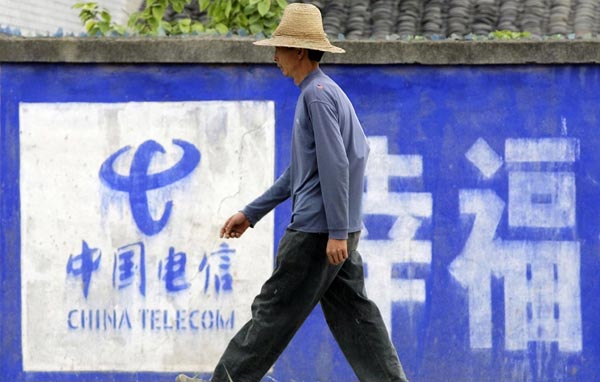China’s two biggest telecom companies are being probed by an anti-monopoly (反垄断) investigation that is being publicized in the state media.
China Telecom (中国电信) and China Unicom (中国联通) are suspected of using their domination of the broadband market to charge higher prices to consumers. The two companies control well over half of the country’s broadband market.

A villager walks past a billboard for China Telecom, near Xiushui, in China's southwest Sichuan province. (AP File Photo/Greg Baker)
The National Development and Reform Commission (NDRC) (发展和改革委员会) has opened up an investigation of the companies, the first big test of anti-monopoly legislation introduced in 2008.
The China Central Television (CCTV) News 30 (央视《新闻30分》节目) program on the State-owned network has been publicizing the investigation with high-profile reports on TV.
The investigation has sparked discussion on forums dedicated to State policies.
Bbs.cntv.cn, the online forum for CNTV, the internet channel for CCTV, has been buzzing about the topic. One poster, FishInWater, posted about the People’s Daily editorial explaining the situation.
The anti-monopoly investigation is directed at the direct line that the internet service providers has in the market. It looks like a competition between the companies for their interest, but in reality it has a lot to do with ordinary users.
On the one hand, the existence of the monopoly is not good for money payers who want to experience lower rates and better service. According the initial assessment, if there was effective competition in the market, then in the next five years the pay rate for going online could lower 27%-38%, and will save 10 to 15 billion yuan.
A commenter Qingzheng, replied
This problem has existed for dozens of years! Why is it being doubted just before the re-election?! They are using the monopoly to ruin the Chinese telecom industry!
Even though the commenter is crowing about a “conspiracy” to overthrow the Chinese people, they do have a good point. Just before the ascension of the next government elite in 2012, it could be a moment for certain politicians to gain power and influence by pointing out State monopolies.
The telecom companies put forward their side in a front-page article in the industry newspaper, China Post and Telecom Daily, which said CCTV “misled the public.”
China Unicom said it “operates its Internet access business pursuant to the license for operating basic telecommunications business in” China, and that it is “in the process of providing the NDRC with the pricing, volume, turnover and other relevant information.”
Li Qing, deputy director of the price supervision and anti-monopoly department of China’s National Development and Reform Commission said, according to the same article, “After the investigation, if the facts are verified and the ruling is proved accurate, they’ll be fined.”

One response to “China’s Largest Telecoms Probed by Anti-Monopoly Investigation”
[…] Telecom () and China Unicom () are suspected of using their domination of the broadband … read full news Published: Wed, 16 Nov 2011 23:00 Tags: China's Largest Telecoms Probed by Anti-Monopoly […]